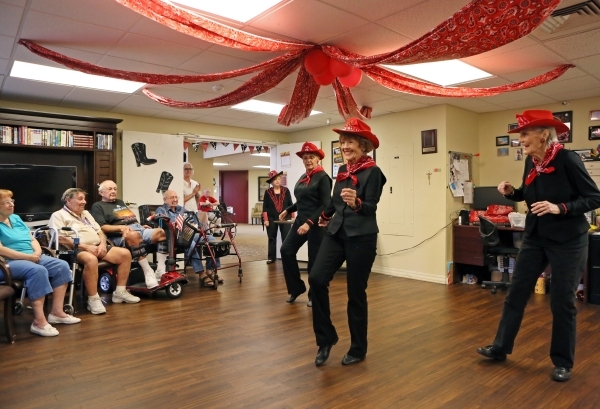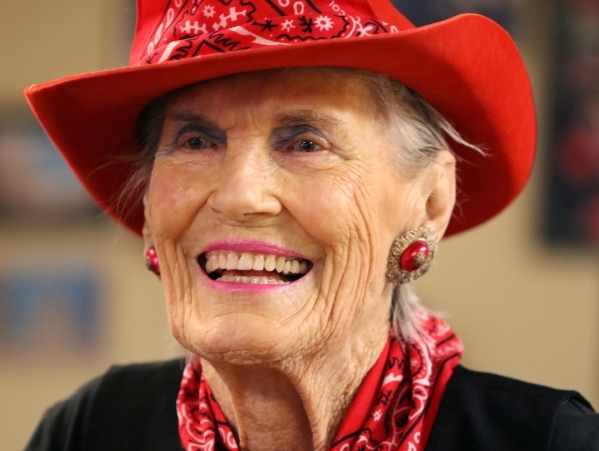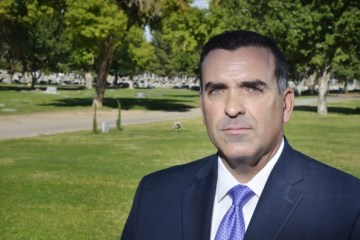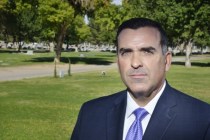Global life expectancy rises, but people live sicker for longer
Ask Betty Lake and Henry Melamed and they'll say they're just having fun.
The 90-year-old Lake's passion for dance and 6-year-old Henry's trips to the farmers market at Tivoli Village exemplify the best advice from medical experts for not just lengthening life expectancy, but optimizing any added years.
Health care professionals work to help people live healthier, not just longer. Exercise and nutrition, two cornerstones of health and longevity, are dividends for Lake and Henry, not the goal.
Henry's mother, Nannette, has started nutritional lessons early with her son and daughter, Sam, 15 months. Her efforts were bolstered by the POP Club, a joint effort of fresh52markets and Chipotle, which granted the money so children receive $5 vouchers to purchase fresh fruit and vegetables.
POP, short for Power of Produce, educates and engages kids about locally and regionally produced agricultural products. In mid-September, Henry Melamed was in the middle of his club's scavenger hunt, and he said most of his $5 voucher was going toward fruits.

"Definitely the fruits ... and the rainbow carrots," he said, referring to the different colors available today beyond the traditional orange.
For Lake, her active life offers mental health benefits.
She started tap dancing when she was 8, and she is part of Three Gals and a Guy, which performs at residential care facilities, hospitals and casinos. She also dances at the Southwest Medical Associates Lifestyle Center in Henderson in a program open to anyone, not just the medical group's patients.
"When I line dance, I don't think about anything else," she said. "We've all come into this with baggage. This is where we get rid of it."
Quality of Life
Life expectancy for Clark County women in 2013 for was 81 years, 8 months, compared to the national average of 81 years, 2 months, according to the Institute for Health Metrics and Evaluation, part of the University of Washington's School of Medicine. For Clark County men it was 76 years, 4 months. Nationally, life expectancy for men was 76 years, 6 months.
For men and women combined, life expectancy in Nevada rose from about 71 years to nearly 79 years from 1980 to 2010, the institute's data show.

The quality of life message was delivered to Las Vegas residents last month by none other than U.S. Surgeon General Vivek Murthy, who was in town to promote the health benefits of walking.
The doctor, who began his four-year term in December, said he will make three major public health campaigns priorities during his tenure: proper nutrition, emotional well-being and physical activity. The goal will be to encourage programs rooted in promoting healthy families and communities.
"Those three things feed off each other," Murthy said in mid-September outside Tate Elementary School in Las Vegas, a campus near Lamb Boulevard and Carey Avenue where most students live close enough to walk to school. "We need to give kids a foundation at the beginning of their lives. Then we need to support that throughout their lives."
Death comes to all living organisms, even as advances create ways to keep people alive. Quality of life issues are gaining steam because for many living longer means little without maintaining faculties and functions.
"We're designed to live only so long," said Dr. Joseph Iser, chief medical officer of the Southern Nevada Health District. "Some people have better genes. They live cognitively unimpaired into their 90s or older. Some people have cognitive decline in their 60s."
People worldwide are living longer, but many also live longer with sickness and disability, according to an Institute of Health Metrics and Evaluation study that examined data from 1990 to 2013.
Gains against infectious diseases and improvements in maternal and child health have led to global life expectancy for both sexes rising by 6.2 years. Healthy life expectancy, however, rose by 5.4 years, meaning people are living more years with illness and disability.
Healthy life expectancy takes into account the effects of chronic illnesses and debilitating conditions that detract from quality of life and impose heavy health care costs.
Healthier Lifestyles
People looking to thwart the predisposition of their genes have many age-defying options. Public and private health experts, schools, community leaders and government officials are developing new and improved ways to keep people active and gain access to nutritious food and emotional well-being.
Gyms market functional-fitness services that lead to a better, fitter, more active life, tapping into consumers embracing the concept of healthy aging. Conferences and health fairs abound promoting healthy aging, including the Successful Aging Expo earlier this month sponsored by the Review-Journal. The wearable device revolution has spurred the creation of numerous activity trackers, and health and fitness devices.
"A higher percentage of people are living healthier lifestyles than they did 20 years ago," said Dr. Kenneth Osgood, a Las Vegas pediatrician. "And the benefits of that have only just begun to surface."
U.S. health statistics show increases in obesity, diabetes, high blood pressure, lung disease and other chronic illness, but some of the data show signs of plateauing, Osgood said. Southern Nevadans have access to more farmers markets, walking trails and bike paths, Osgood said, and advances in those initiatives have accelerated over the past 10 years.
"We're not there yet," Osgood said. "But we're creating an environment where people can choose healthy lifestyles, and it's accessible."
Companies looking to sustain more productive workforces have strategies to maintain the health of their employees to keep them healthier. Gaming companies offer lunchrooms with free healthful food offerings for employees on their breaks. Caesars Entertainment has a Health and Wellness Center, including a medical clinic and fitness center, and MGM Resorts International has a wellness center and a fun room that includes treadmills with computers so employees can work while burning calories.
Boyd Gaming offers financial incentives to employees if they participate in medical screenings and meet with a health coach. Bob Berglund, Boyd's vice president of benefits, said the company will start a program called Healthy Rewards, offering even more financial incentives to workers who lower their blood pressure and cholesterol readings, and lose weight.
"We're creating a culture of health awareness, a culture of healthy behaviors," Berglund said. "Our team members expect us to constantly give them new ideas and resources to help them."
All of the efforts are attempts to tap into a fountain of youth and disrupt death, but another benefit will be a reduction of overall health care costs. In 2013, U.S. health care spending increased 3.6 percent, reaching $2.9 trillion or $9,255 per person, according to the Centers for Medicare and Medicaid Services.
"Health care costs are dramatically increased by people living longer and not being able to take care of themselves," Iser said. "The burden on families is more than the financial burden. The emotional and physical burden can be just as taxing, and it's something most of us are going to face at some point."
Contact Steven Moore at smoore@reviewjournal.com or 702-380-4563.
One sure bet: Death in Las Vegas



























